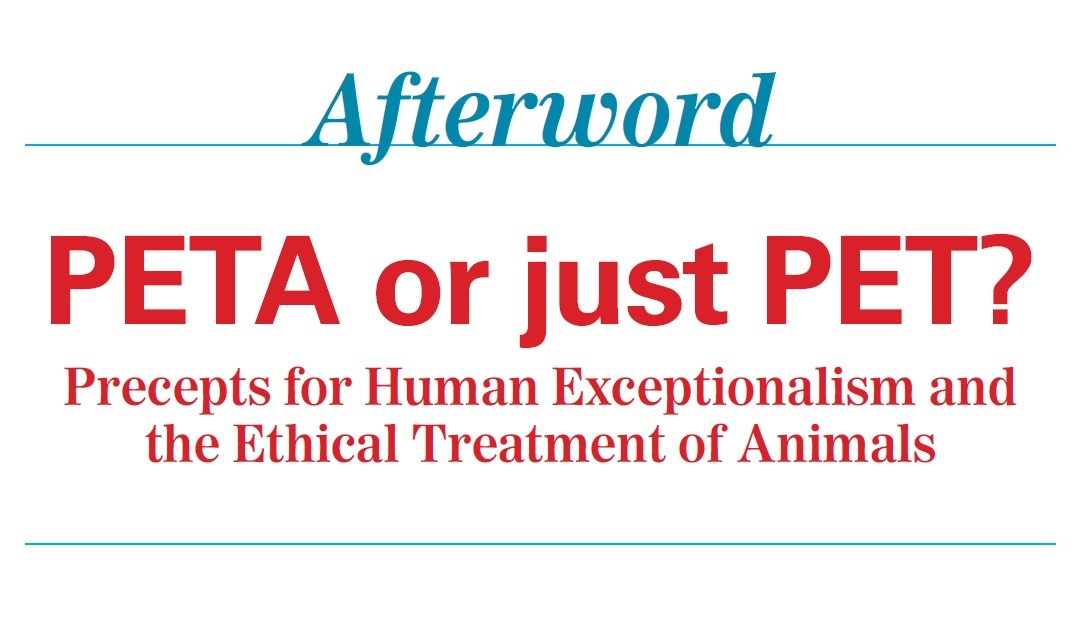This article first appeared in the Christian Research Journal, volume 37, number 02 (2014). The full text of this article in PDF format can be obtained by clicking here. For more information about the Christian Research Journal, click here
People for the Ethical Treatment of Animals (PETA) embrace a worldview that elevates animals to equivalency with humans. Indeed, from their perspective that is precisely what animals are: fellow beings on a level playing field with humanity. Some, such as bioethics professor Peter Singer, have gone even further. From his perspective a disabled newborn has less value than a chimpanzee.
As an animal lover, I embrace the ethical treatment of animals but hardly the ethics of Singer or the PETA organization. Instead, in the tradition of William Wilberforce who not only fought against the tyranny of slavery but founded the Royal Society of the Prevention of Cruelty to Animals (RSPCA), I am deeply committed to the humane treatment of pets and to the sanctified preservation of wildlife. As such, allow me to forward in place of PETA the acronym PET (Precept, Exceptionalism, Treatment).
First and foremost is a primary precept of biblical theology. That precept is this: created things, including animals, are intended to serve humankind in order that humankind can rightly serve and worship the King of Creation. As Dr. Wes Jamison has rightly noted (p.15), “though all creation was good, man was given a special place and power within creation in relationship to God.” The Belgic Confession, as summarized by Jamison, aptly captures the biblical teaching that “all creation is intended to serve man, so that man may in turn serve God. In the wisdom of God, His creation, although stratified and hierarchical, is focused on Him and His glory.” Says Jamison, “in their zeal to protect the creation, animal rights activists have thrown out the theological baby with the fallen bath water.”
Furthermore, there is the matter of human exceptionalism. Human beings are made in the image of God. And that makes all the difference in the world. The imago Dei ensures a Down syndrome child is afforded the same dignity given a distinguished scientist. Contra neo-Darwinians such as Richard Dawkins who hold that human beings have no more intrinsic value than bananas, humanity is the apex of God’s creation. As such, a child is to be cherished on a level that surpasses the cherishing of a chimpanzee. Indeed, the PETA rush toward affording a chimp the personhood ascribed to a child is both wrong-headed and ridiculous.
Finally, consideration of the treatment of animals is an ethical imperative as sacred to Christians as it is to PETA. As Proverbs 12:10 makes plain, “A righteous man cares for the needs of his animal.” We are created in the image of God and, as such, are commissioned to treat nonhuman life with the care and consideration afforded them by the Creator Himself. As He is our protector, we are to be theirs. While we may eat lamb as our Lord did during Passover celebrations, we must never treat lambs in a way that dishonors their Creator.
In sum, a primary precept of biblical theology is that animals occupy a special role in the hierarchy of creation. While we must never supplant human exceptionalism for animal equality, we are nonetheless called to the ethical treatment of animals. As they populated Paradise past, so they will most certainly populate Paradise restored. As C. S. Lewis has well supposed, pets “may have an immortality, not in themselves, but in the immortality of their masters.“1
—Hank Hanegraaff
Hank Hanegraaff is president of the Christian Research Institute.
NOTES
- C. S. Lewis, The Problem of Pain (New York: Collier Books, 1962), 139–40.









